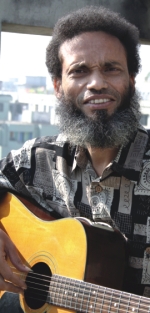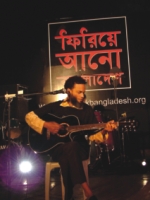| Cover Story
Hyder Husyn
Music to Make People Think
Hana Shams Ahmed
 When the country received its independence from the ruthless Pakistani army more than 30 years ago, the freedom fighters, martyrs and patriots never imagined that the socio-political state of the country would come to such decay. Hyder Husyn, who watched first-hand the birth of his beloved motherland, the subsequent journey to the present day chaos and turbulence, decided to shake the collective conscience of the nation in the best way known to him, through his music. This 43-year-old talks about his comeback into the music scene with a bang, his religious inclinations and his nostalgia about the good old days as a local boy of Old Dhaka. When the country received its independence from the ruthless Pakistani army more than 30 years ago, the freedom fighters, martyrs and patriots never imagined that the socio-political state of the country would come to such decay. Hyder Husyn, who watched first-hand the birth of his beloved motherland, the subsequent journey to the present day chaos and turbulence, decided to shake the collective conscience of the nation in the best way known to him, through his music. This 43-year-old talks about his comeback into the music scene with a bang, his religious inclinations and his nostalgia about the good old days as a local boy of Old Dhaka.
Husyn's album 'Phaissa Gechi' has managed to hit the right chord in everyone's hearts with its strong moral messages and simple, down-to-earth melodies. Husyn might seem like a newcomer to the music scene but that will actually be very far from the truth. About two decades, ago a song written and composed by him was one of the hottest selling numbers of that time. 'Mon ki je chai bolo', played by the band Winning (where Husyn was one of its founding members), was a very simple yet intense love song that has made a reappearance in Husyn's album 'Phaissa Gechi'. He has also played the guitar for many Bangla film backgrounds.
“I never took music as my profession,” says Husyn, “Although I used to play (the guitar) in Bangla film backgrounds, it was never my source of earning. And when I had exams I had to keep that off too.” Husyn completed his degree in Aircraft Engineering from Chelsea College of Aeronautical and Automobile Engineering and then went on to Northrop Rice Aviation Institute of Technology in California to get his aeronautical license. After coming back to Bangladesh he worked for Bangladesh Biman as an aircraft engineer for some time. “Now I am a professional jharudar,” he laughs, talking about his company Mr Cleanse, “I do music to clean people's hearts and my business cleaning people's surroundings.”
Although 'Phaissa Gechi' was released in May 2005, it was after the music video of 'Tirish Bochor' (30 years) was released by Channel 1 this year that the album's popularity skyrocketed. Despite the album being such a hit, Husyn remains modest about his success. “I keep telling people that I am not a singer. I don't think I have the qualities that a singer should have,” he insists, “You can call me a lyricist and a composer to some extent. I am a singer at the very last.” And it is indeed the lyrics that have been the main focus of his album.
Husyn believes that music can influence a society's mindset much more strongly than any long harangue from a political leader. “How much of an influence music can have on a society has been proven during the liberation war. Songs like 'Joy Bangla, Banglar Joi' made us dream about independence,” says Husyn. His main inspiration for singing is to motivate people. Husyn talks about how a government officer came up to him and admitted that he did not how his future would turn out with all the bribes he was taking. Another freedom fighter's son came up to him one day and said that his father who had never presented himself as a freedom fighter was now bravely doing so after listening to his songs. “It's very positive for me that I can actually make people think,” he says.
Husyn attributes part of his long break to the fact that he actually writes on impulse. “I write songs when I feel something. It's also a matter of practice -- once I start writing it starts flowing, and once I stop I can't write anymore. When I came back to Dhaka I started working and did not think about music for a while. After some time I started writing,” he says.
Husyn admits that he is slightly old-fashioned about his ideologies regarding music and life in general. “The situation is such that music is not just about listening any more, it's also about watching. I do not believe that is how it should be. Music is only about listening and you should be able to appreciate it with your eyes closed,” exclaims Husyn. He thinks it's a shame that there is so much focus on presentation of a song that subsequently very little importance is given to lyrics and tune. “I don't think music should be just for entertainment,” he adds. Husyn believes that music is a very strong medium and since stars can influence the way people think they should use this to do something positive. “My main mission is to use the advantageous position of show business to encourage people,” says Husyn.
When asked about how to define Bangladeshi music he admits that he does not really keep up with musical trends. “In fact, I don't even have any instruments for listening to music at home,” says Husyn, “Nowadays I get to listen to the work of some of the musicians because I go to so many shows and there I hear the other artistes.” One criticism about the music industry Husyn points to is the trend of music directors popping up everywhere as a result of the rapid advancement of technology. “When we first started music we never thought of becoming a music director. It's a big responsibility,” he points out, “It's about organising a whole team of musicians.” Husyn acknowledges that technology has its advantages but adds, “If people start spending more time on these, the originality of music, I am afraid, will be lost forever.”
 |
Performing at 'Take back Bangladesh', a movement initiated by musicians and artists earlier this month opposing the political violence in Bangladesh. |
He has the same views on the latest trend in music of remixing old songs and presenting them in a modern way. “I don't see anything wrong with remixing in itself but of course if it is done badly then the end product won't be very tasteful,” says Husyn, “There are many beautiful old songs that people would not listen to because the music is so old-fashioned. But when that song is presented with contemporary music, its acceptability rises immediately.” He points to Habib's (Wahid) remixing of a Sylheti folk song 'Krishno'. “It's a very old song and most people had forgotten all about it,” he says, “But people have started listening to it again because of Habib; because he has the talent to present it in a nice and modern way.”
Husyn also praises the efforts of the talent hunt competitions, that are all the rage now, although he points out that the companies that sponsor these shows do not necessarily have music promotion topmost on their mind. “We might say that the companies are doing it because it is a business interest for them but at the same time, it is for us to see that we are able to utilise it in the correct way,” says Husyn. He thinks that it is praiseworthy that they are reviving the practice of old Bangla songs. “At one point we were getting immersed in Hindi music, but because of these competitions people are once again listening to Bangla songs, some of which we hadn't heard for ages.” He adds, “It's also a good way to keep the young generation occupied.” Husyn believes that if they keep themselves busy with such cultural activities they won't have the chance to think about any anti-social activities.
Husyn follows a strict code of lifestyle. Anyone wondering whether there is a mystery behind his bushy beard will be glad to know that there is none. It is partly because it was a childhood fascination and partly for religious reasons. “When I was very young, women used to wear tassels in her hair, and I used to take my mom's tassel and pretend it was a beard,” he says. Asked if he is very religious he says he is not so in the sense it is used in Bangladesh. “I try to implement the things that religion teaches into my life but it is not possible for me to say my prayers regularly.”
The best time of Hyder Husyn's life was the time he spent in his hometown of Old Dhaka. His title song 'Phaissa Gechi' sung in typical Old Dhaka accent is further proof of that. He speaks nostalgically about how united people in his community was back when he was a young boy. He thinks it's a shame that such community spirit is unimaginable in today's society. In fact it is the problems of society that has made Husyn put his foot down and reach out to people and make them realise that it is indeed in the people's hands to change the direction of society. And in the current socio-political condition, it is people like Husyn that we need to create an uprising.
Copyright
(R) thedailystar.net 2006 |
